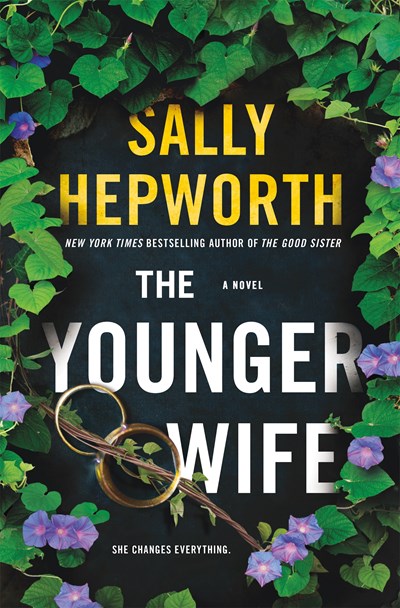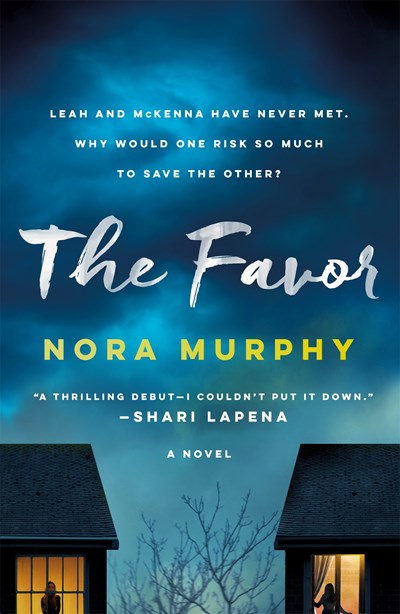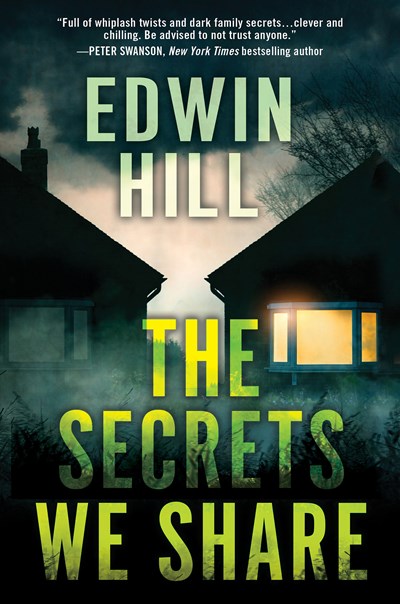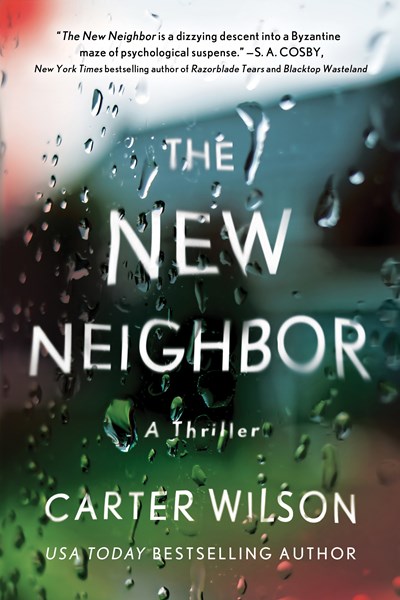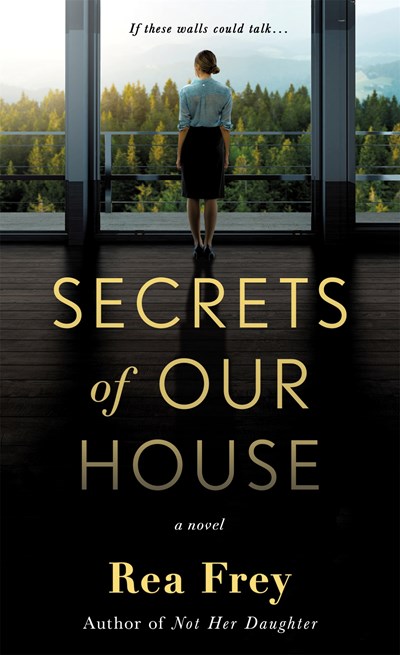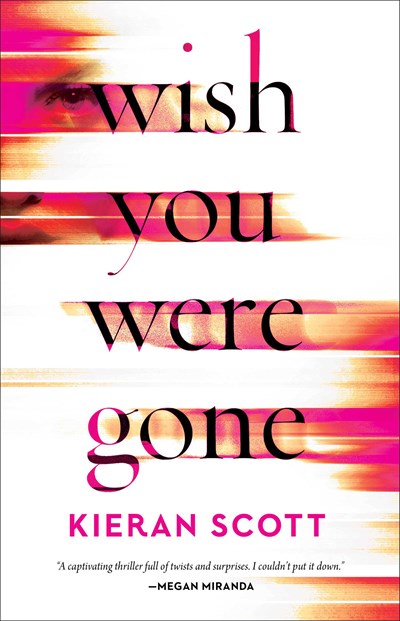Quirky meets romantic meets WTF in this Australian import that’s brimming with character. Two very different sisters are at the center of the maelstrom. Rachel is a beautiful and successful baker who spends a week perfecting tiny roses on a wedding cake but eats two tiers of it by the fistful hours before delivery. Her sister, Tully, married with two little boys, is consumed with anxiety and a compulsion to steal. The younger wife of the title is Heather, who’s marrying Rachel and Tully’s father, Stephen Aston, and whose big day opens the novel. Stephen’s ex-wife roaming the altar during the vows is bad enough, but when the couple moves to the sacristy, a scream is heard and the celebrant reappears in the church covered in blood. Hepworth (The Secrets of Midwives) then chronicles the leadup to this chaos, a saga that involves a hot water bottle stuffed with $100,000, romance with cake-pun-loving delivery man, and hilarious observations about the million ways we sabotage ourselves. The Astons also face their share of heartaches and worse (Alzheimer’s disease, rape, and domestic violence are part of the story). For fans of domestic suspense and of the Australian show Offspring, which also features loving sisters and their interesting choices.
Domestic
This is one of the best-plotted thrillers I’ve read in ages; it’s also a great portrayal of why women experiencing domestic violence are stuck. We meet Leah Dawson during her carefully choreographed routine of visiting a different liquor store every day. She hides the booze from her violent husband, Liam, a lawyer who has coercive control down to an artform. Leah’s legal career came to an end recently because her husband didn’t like her reading a work email at dinner, and took action. At the liquor store, something compels Leah to follow a fellow shopper, pediatrician McKenna Hawkins. Soon Leah’s routinely watching the woman, who’s also needlessly unemployed, from the street outside McKenna’s clinically clean home. The reason Leah felt drawn to McKenna is quickly apparent: McKenna is just like Leah, or rather McKenna’s husband, Zach, is just like Leah’s Liam. Both have ego to spare, enjoy speaking slowly to their wives to make them feel stupid, and are financially abusive. These guys have it all, until they don’t. No spoilers here, but get this book for the very original storyline, true-to-life characters, and a searing look at the pain and mind games endured behind too many closed doors. For more on why “she can leave any time” is ridiculous and insulting, read the afterword by Murphy, an attorney who’s represented survivors of intimate partner violence.
A bold, ambitious novel with a big, multigenerational story line, a busload of characters, and a smart balance between mystery and suspense. Natalie Cavanaugh and Glenn Abbott are sisters, but not the least alike. Natalie is a tough-as-nails Boston cop, while Glenn is a food blogger and now a book author. What they have in common is what they never talk about: the murder of their father, who was bludgeoned to death in the woods behind their house. But through a series of incidents in Glenn’s life today, the women are drawn back into their shared past, and the story line opens up to include Glenn’s husband, her tween daughter, Natalie’s colleagues on the police force, and many more. It’s remarkable that Hill can keep so many subplots afloat while at the same time creating such a level of suspense that the reader feels as though they are being catapulted to the knock-out conclusion. Hill is the author of the more cozy-ish Hester Thursby series, and librarian Hester makes a few delightful cameos in this book. For fans of Robert Bryndza and Karin Slaughter.
Get ready to care far more than you thought you could about fictional strangers. The three in question are Jade, the busy, pampered wife of Atlanta celebrity chef Cam Lasky; and her children, Beatrix and Baxter. This book wastes no time on background, and we get to know these characters as they enter a domestic horror scene. Arriving home from violin-prodigy Beatrix’s music lesson, they are met in the garage by a masked gunman who takes them hostage for a day of psychological terror. He wants $734,296, an odd demand that Jade gives her flashy husband when she can get a word in over the phone, starting him on a desperate quest. The overextended, secretly broke businessman, who’s not the most sympathetic character, is brought to his knees while his family’s love and strength are pushed to the limit. Each character is meticulously drawn, and presented from multiple angles, as the story plays out from the alternating viewpoints of Jade, Cam, and for a short time, the kidnapper. In a clever device, much of Cam’s narrative involves him answering questions in a post-event sensationalist TV interview, which allows Belle (Dear Wife, The Marriage Lie) to parcel out information bit by tantalizing bit. Read something mellow after this, you’ll need it.
Ten years ago, Lydia was kidnapped, then spent the subsequent decade locked in a hunting cabin, subjected to torture and abuse. Miraculously, she managed to escape—feigning death—and after several months of homelessness made it to the coastal town where her husband, Luca, and Merritt, his second wife, live. At first glance, Luca and Merritt, who married a couple of years after Lydia disappeared and was declared dead, have it all: homes, cars, several restaurants that they own, a beautiful child, another on its way. How will Lydia’s resurrection rock Luca and Merritt’s world? With chapters alternating between Lydia and Merritt’s points of view, we watch the tentative relationship between the two women grow. Merritt tries to help Lydia while Lydia charts her own course, deciding how she wants to be helped. Kent does a terrific job of creating suspense—we know a bomb is about to go off, just not which one—and when it does, we’re totally spun about. But the book doesn’t end there, as two more revelations upturn everything we know. Credible? You’ll be too terrified to care.
Aidan Marlowe—an Irish immigrant to the U.S. who is known by his last name—is lost in a life he never planned. At his young wife’s funeral, he finds out that he won millions in the lottery, and he can’t adjust to life without Holly and with the money. He and his seven-year-old twins move to a huge and forbidding house in Bury, New Hampshire, a move prompted by a voice in his head repeating “bury,” just one of the psychological oddnesses he endures. People in affluent Bury soon let him know that his decision was a bad one: the house was formerly home to a family that’s now missing four members who simply disappeared. And soon after Marlowe and his children move in, he begins receiving threatening letters that make his neighbors’ misgivings seem right but also force him to investigate the neighbors themselves. Marlowe is an unreliable narrator, so that even as readers feel for his turmoil, they are left wondering what’s really going on with this troubled character. Some truly frightening scenes lead to a gripping and satisfying conclusion, but not before a twist that will leave readers’ heads spinning. Marlowe is memorable —single dads in thrillers aren’t that common—but mainly he will stay with readers because of his offbeat vulnerability and the determination that shines through his grief. Wilson’s (The Dead Girl in 2A) unusual psychological thriller is one for fans of Stephen King who are open to reading mysteries.
Suspense fiction for those who enjoy character-driven stories, plenty of dialogue, and simple, straightforward prose. Single parent Kate is awoken by noise in her backyard, but it’s just deer. Then she sees some teens running from the cottage at the end of her property. Days later she starts getting anonymous texts—which are vaguely threatening—then a window is smashed and a knife is found embedded in the cottage’s wall. This would be enough to set anyone on edge, but Kate is especially vulnerable; she survived a home invasion two years ago in which her husband, a cop, was murdered. Fortunately, the former police chief is her father-in-law, and her sister —they’ve been estranged for 20-plus years—agrees to move in and help raise Kate’s two kids. As the terror slowly escalates, and the list of potential suspects grows, Kate has to go deeper into her past to understand who wants to kill her today.
This is one of those books that makes you want to befriend the characters, or at least get annual updates on how it’s all going. It’s a family story with two couples as focal points: Desiree (Desi) and Peter, whose marriage seems to be ending, due in part to a mysterious past event; and their daughter Jules and her boyfriend Will, crazy-in-love teenagers. While the young couple’s romance is just starting, it also seems doomed, as Jules is a rich, summertime-only visitor to Will’s rural North Carolina town and is leaving soon for college while less-well-off Will stays put. Both relationships are tested by tragedies and bring each character’s most extreme emotions to the forefront, feelings that are poignantly described by Frey (Until I Find You, 2020). Desi is a particular highlight, with her flawed parenting lending a rawness and realness to the book; the strain induced by tragedy brings her to drop a bombshell revelation that shocks family and readers alike. After this, you may feel like no other characters can measure up and head straight to the TV; once that has passed, try a book I’ve recommended in First Clue before, but I’m doing it again! Paullina Simons’s The Girl in Times Square; those characters almost ruined me for other books.
Nancy Thayer meets Liane Moriarty in this mystery starring Emma, Gray, and Lizzie, three friends who must pick up the pieces when one is tragically widowed. Well….two friends and a frenemy. And OK, it’s not that tragic either, as the dead husband is an abuser who dies when he drunk-accelerates into his own garage wall. In fact, nothing is as it seemed when Emma’s now-dead husband, James, was making megabucks with Gray’s husband at their sports-star PR firm. After James meets his boozy end, the sports world and the family’s Hamptons-in-Jersey town is shocked, and so are Emma and her children. But as the days pass, the fear and shock recede, only to reveal mysteries that Emma can’t ignore. The stronger-than-she-knew mother starts by following a clue that the crash may not have been an accident; investigating, she finds out more about her husband and his sordid life, but mostly allows Scott (the True Love and Non-Blond Cheerleader series; and writing as Kate Brian, the Shadowlands trilogy) to reveal that life after toxic secrets is always better. Come for the friendship story, stay for the startling twists.
Lily Atwood has the titular perfect life. She’s an Emmy-winning journalist, the kind who wants to be hard-hitting but mostly presents human-interest stories from the comfort of a studio. Every evening, Lily gets to return to her designer Boston home to spend time with her daughter, Rowen, the center of her single-mom existence. Some of Lily’s stories, the juicer ones, are fed to the journalist and her behind-the-scenes right-hand, Greer, by a man calling himself Mr. Smith. They’re sure it’s a pseudonym, but are content to idly wonder about Smith’s identity and motives as long as the tips keep coming. Then he starts getting sinister—at least, Lily thinks it’s Smith who’s behind anonymous flower deliveries to her home, though she’s never given him her address. He also seems overly familiar with events at her daughter’s school. Lily is afraid that he may reveal private details that could finish her career, but she soon has far more to fear. An author’s note reveals that Ryan wrote this during COVID, and the feeling of being trapped and at the same time wanting to hide away permeates the novel. The surprises keep coming, and the tightly woven storytelling closes with a deft, satisfying twist. Fans of the author should add this to their library hold lists as it’s not going to sit on shelves. While waiting, they can try Belinda Bauer’s The Beautiful Dead, which also features a journalist in peril.

